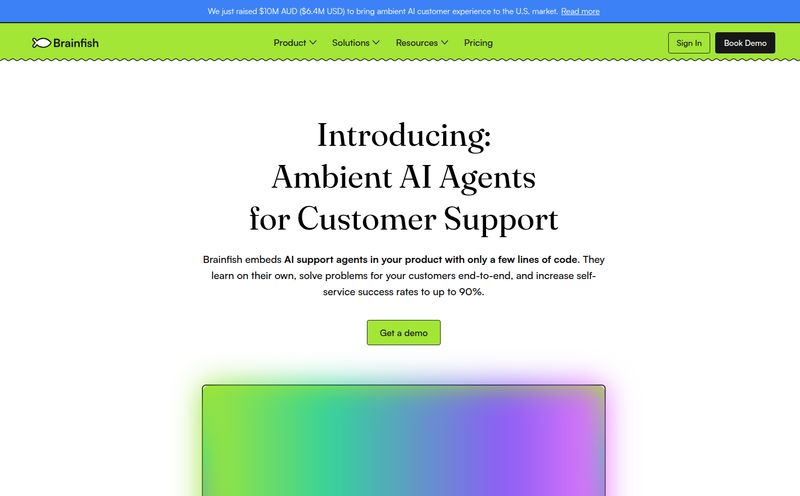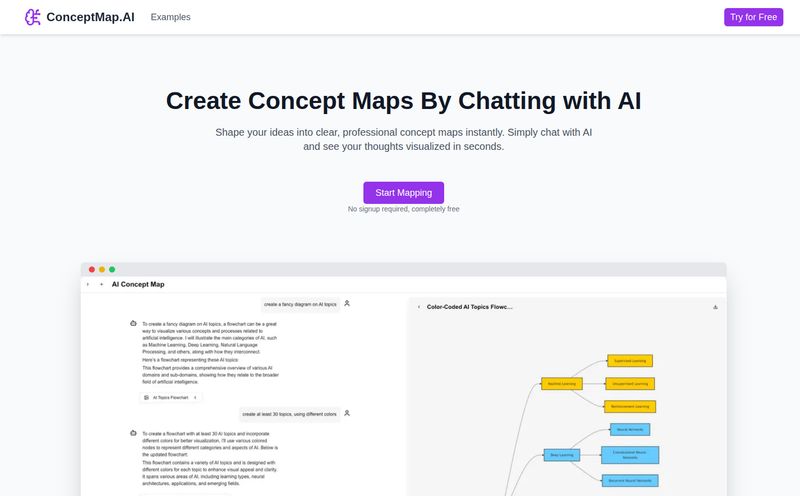You know the one. It’s a beast that never sleeps, a digital hydra where for every ticket you close, two more seem to sprout in its place. I’ve been in the trenches of online business for years, and if there’s one constant, it’s that relentless tide of “Where’s my order?”, “Do you ship to Antarctica?”, and the occasional, completely baffling question that makes you question your life choices.
For as long as I can remember, we’ve been searching for the holy grail—a tool that can tame this beast. Every year, a new wave of software promises to be the one. And lately, with the explosion of AI, that promise is louder than ever. So when I saw Mindlake.ai pop up on my radar, my first reaction was a healthy mix of skepticism and, I’ll admit, a little bit of hope. Its website is sparse, rocking a “Coming Soon” vibe, which either means it’s vaporware or we’re on the ground floor of something interesting. I’m betting on the latter.
What Exactly Is Mindlake Supposed to Do?
From what I've gathered, Mindlake isn't just another chatbot you plug in and hope for the best. The pitch is a bit more ambitious. Think of it less as a simple tool and more like a central brain for all your company’s scattered knowledge. It’s designed to be a search engine that organizes everything—your emails, your Slack messages, your support tickets, your internal docs—into one searchable, intelligent system.
But the real magic, the part that e-commerce folks will care about, is what it does with that brain. It powers an AI support agent that handles customer support tickets automatically. It doesn't just spit out canned responses; it supposedly learns from your entire communication history to provide relevant, accurate answers. It’s like hiring a support agent with a photographic memory of every customer interaction your business has ever had. A pretty compelling idea, right?
The Core Features That Have Me Intrigued
A feature list is just a list. What matters is how those features solve a real, throbbing headache. And Mindlake’s proposed features seem to target some of the biggest pain points in the game.
The Promise of True Intelligent Automation
We've all seen “automation” that just creates more work. A poorly configured auto-responder can do more harm than good. Mindlake talks about intelligent automation and smart routing. This implies a system that doesn't just answer the easy stuff but also understands nuance. It can identify a simple tracking query and handle it instantly, but it can also (in theory) recognize a complex complaint from a high-value customer and immediately route it to a senior human agent. That’s not just automation; thats triage. And effective triage is the difference between a support system that works and one that’s on fire.

Visit Mindlake AI
Learning from Your Past (Without the Baggage)
This is the big one for me. The concept of historical data learning is where most AI tools live or die. Mindlake claims to integrate with your knowledge base, your Gmail, your Zendesk, and learn from how your team has actually solved problems in the past. This is infinitely better than manually programming a bot with Q&As. It’s organic.
Of course, this comes with a huge caveat that any data scientist will tell you: garbage in, garbage out. If your historical support data is a mess of incorrect, inconsistent, or rude replies, your AI will learn to be a messy, inconsistent, rude agent. So, its effectiveness is directly tied to the quality of the data you feed it. Something to keep in mind.
A Connected Ecosystem, Not Another Silo
My desk is already littered with logins for a dozen different SaaS tools. The last thing I need is another isolated platform. The fact that Mindlake is built around integrations is a massive green flag. Mentioning big names like Gmail and Zendesk from the get-go shows they understand that a support tool must play well with the systems businesses already rely on. This multi-channel support approach is non-negotiable in 2024.
Let's Be Real: The Potential Highs and Lows
No tool is perfect, especially one that hasn't even fully launched. Based on the info available and my years of experience with similar platforms, here's my honest take on the potential pros and cons.
On the upside, the benefits are the stuff of e-commerce dreams. You could genuinely reduce support costs and free up your human agents to focus on complex, relationship-building tasks instead of answering “what’s my tracking number?” for the 80th time in a day. Offering 24/7 availability without burning out your team can be a huge competitive advantage, leading to better customer satisfaction. And if the system truly learns and scales, it could grow with your business, preventing those painful moments when your support capacity just can’t keep up with your sales volume.
Now, for a dose of reality. The setup will likely require some initial heavy lifting. Connecting data sources and “training” the AI isn't a one-click process. As mentioned, its effectiveness is entirely dependent on your data quality. And let's be crystal clear: this will not replace your need for skilled human support agents. For complex, emotionally charged, or brand-new issues, you will always need a person. The AI is a copilot, not the pilot. Believing otherwise is a recipe for disaster.
Who Is This Really For? (And What About the Price?)
So who should be hitting that “Get Quotation” button? I don't see this being for the brand-new Shopify store owner running things from their garage. It seems squarely aimed at established, growing e-commerce businesses that are feeling the operational strain. The ones where the founder can’t handle all the tickets anymore and the support team is starting to look stretched thin. It’s for businesses that have a decent volume of historical data for the AI to actually learn from.
As for the price? Well, there isn't one listed. The “Get Quotation” button is a dead giveaway that we're not looking at a simple three-tiered SaaS pricing model. This suggests a more enterprise-level or custom pricing structure, likely based on ticket volume, the number of integrations, and the level of support required. I wouldn't expect it to be cheap, but if it delivers on its promises, the ROI in saved time and increased customer retention could make it a worthwhile investment.
My Final Take (For Now)
So, is Mindlake.ai just more AI hype? Maybe. But I’m cautiously optimistic. It’s targeting a very real, very expensive problem with a smart, modern approach. The emphasis on learning from a business’s own unique history is the right way to think about AI in this space.
The entire thing will hinge on execution. How good is the learning algorithm? How intuitive is the setup? How seamless are the integrations? These are the questions that will determine if Mindlake becomes an indispensable part of the e-commerce stack or just another forgotten password in my LastPass. I’ve put my email in to get a quotation, and you can bet I’ll be reporting back once I get a look under the hood. The beast of customer support is always hungry, and I'm always on the hunt for a better way to tame it.
Frequently Asked Questions about Mindlake.ai
- What is Mindlake.ai in simple terms?
- Think of it as an intelligent assistant for your e-commerce business. It reads all your past emails and support tickets to learn how to answer customer questions, then automatically handles incoming support requests 24/7.
- Is Mindlake.ai only for e-commerce?
- While its primary focus seems to be e-commerce support, the underlying technology of organizing and searching all company communications could potentially be applied to other industries as well.
- How does Mindlake learn to answer questions?
- It integrates with your existing tools like Gmail, Zendesk, and internal knowledge bases. It then analyzes this historical data—all the questions and answers from the past—to understand your products, policies, and tone of voice.
- Will Mindlake replace my human customer support team?
- No, and it's not designed to. The goal is to automate repetitive, simple queries, which frees up your human agents to handle more complex, sensitive, or high-value customer interactions that require empathy and critical thinking.
- How much does Mindlake.ai cost?
- Currently, Mindlake.ai is in a "Coming Soon" phase and does not have public pricing. You need to request a quote through their website, which suggests a custom pricing model based on your business's size and needs.
- What tools does Mindlake integrate with?
- The initial information highlights integrations with key e-commerce and communication tools like Gmail, Zendesk, and various knowledge bases. More integrations are likely planned for its full release.
Conclusion
The world of e-commerce support is at a turning point. Manual, repetitive work is slowly but surely being handed over to intelligent systems, and that’s a good thing. It allows businesses to be more efficient and, more importantly, allows humans to focus on the human side of commerce. While Mindlake.ai is still a bit of a mystery box, the ideas inside are compelling. It represents a potential shift from simple automation to genuine intelligence in customer interaction. Whether it lives up to that potential remains to be seen, but it's a development I'll be watching with great interest.
Reference and Sources
- The official website for information and quotes: Mindlake.ai
- For further reading on AI trends in customer service: "The Future of Customer Service: 2024 AI Trends" via Zendesk Blog



